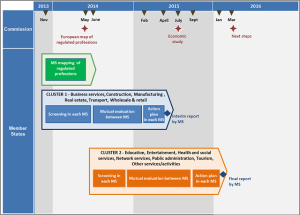Introduction
So the Solicitors’ Regulation Authority (SRA) has unveiled a consultation paper on the future training and assessment of solicitors in England and Wales – proposing, inter alia, a standardised competence assessment (The Solicitor Qualifying Exam (SQE)) for all those seeking qualification as a solicitor in England and Wales – its preferred option (§12). The consultation report indicates that the current multitude of routes to qualification as a solicitor makes comparability of competence / standards impossible, and points to the 800+ complaints about solicitors upheld by the Solicitors Ombudsman and the £23.8 million pounds of payouts by the SRA Compensation Fund as possible indicators that training for solicitors is inadequate. These admittedly have rather weak links to training.
The development of ‘flexible and innovative, and more affordable training’ are potential gains from the possible de-regulation or semi-de-regulation of the current access routes to the profession of solicitor that a new centralised SQE might permit. These pathway questions will be considered in another SRA consultation in the course of 2016.
Richard Moorhead and Julian Webb have posted blogs on the consultation paper, reflecting on the possible consequences for law schools and other providers of training in the UK. This post, after outlining the main issues (Part One) looks at the proposals from a European perspective (Part Two) (to follow).
Part One: The proposed SQE
When introducing the Statement of Solicitor Competence in 2014 the SRA indicated that it would be consulting about three potential options for assessing the competence of solicitors. These were set out then and §11 of the current consultation reiterates them:
Option 1: Continuing to prescribe a limited number of pathways to qualification, the details of which we specify, which are aligned to the Statement of Solicitor Competence Statement, Statement of Legal Knowledge, and Threshold Standard.
Option 2: Rather than prescribing a limited number of pathways, authorising any training pathway developed by a training provider which enables a candidate to demonstrate they can perform the activities set out in the Statement of Solicitor Competence to the standard required in the Threshold Standard.
Option 3: Developing a centralised assessment of competence that all candidates are required to undertake prior to qualification, again aligned to the Statement of Solicitor Competence, Statement of Legal Knowledge and Threshold Standard.
The options are not mutually exclusive and so various routes and requirements for candidates could ultimately be imposed before they would become eligible to take the SQE.
The SQE
The introduction of the consultation paper states:
This common professional assessment, the Solicitors Qualifying Examination (SQE), would consist of a Part 1 assessment of knowledge, and a Part 2 assessment of skills.
Under the proposals, Part 1, taken first, will comprise a Legal knowledge Assessment and Part 2 a Practical Legal Skills Assessment will follow. Both assessments will be modularised thus allowing flexibility for those in training. The two parts will be equally weighted. In 2016 the SRA will publish a detailed Assessment Framework document that will ‘help inform the design of future education and training programme’. The legal knowledge element covered in Part 1, and assessed by ‘computer-based objective testing’, will include the following subjects:
… ethics and professional conduct, wills and probate, taxation, business law and practice, property law, torts, criminal law and evidence, criminal litigation, civil litigation, contract law, trusts and equitable wrongs, constitutional law, EU law, human rights, and the English legal system. (§41)
The Part 2 assessments will
use standardised practical legal tasks, including role plays with standardised clients for the oral skills and case studies to assess the written skills, to assess the application of knowledge and skills in a range of contexts. The contexts are: civil litigation, criminal litigation, property law and practice, wills and probate, law of organisations. Each skill area must be assessed twice, in two different contexts. Across all assessments, candidates must cover three out of the five contexts, including both contentious and non-contentious elements. (§42)
The Part 2 assessment will cover the areas where solicitors have “reserved activities” but not all of these will be assessed, just three out of five areas. Even then, some firms that provide training might have to ‘wastefully’ provide additional training (for areas where they do not in fact practice) (§49). The skills assessed will include:
- interviewing and advising
- advocacy/oral presentation
- negotiation
- writing
- drafting
- legal research
The consultation paper also considers the costs of the new regime for trainees (likely cheaper – but as yet unknown) and the impact of the possible new scheme on diversity of the profession (possibly more transparent).
The SRA Consultation paper Training for Tomorrow: assessing competence is available here (PDF)(60 pages). This Training for Tomorrow initiative consultation is open until March 4th 2016. Any changes to come, are not yet decided upon, and would not be ready until at least 2018-2019. Responses to the consultation will be very welcomed by the SRA.


